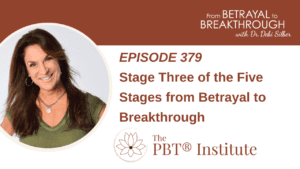
Episode Overview
In this episode, we delve into Stage 3 of the 5 Stages from Betrayal to Breakthrough. If you’re unsure which stage you’re in, by the end of this episode, you’ll have a clear understanding. We cover:
- The feelings, personas, and experiences typical of Stage 3.
- Why Stage 3 is the most common stage where people get stuck.
- The consequences of staying in Stage 3 and how to move forward.
Key Points
Understanding Stage 3
- Common Feelings and Experiences: Stage 3 is characterized by small self-benefits like being right, blaming others, and getting sympathy without having to rebuild trust.
- Negative Thought Patterns: The mind starts believing destructive thoughts, leading to deeper entrenchment in Stage 3.
- Energy Attraction: Like energy attracts like energy, resulting in circumstances and relationships that confirm the negative state.
Personas in Stage 3
- Alex: Struggles with unanswered questions and the fear of confronting raw emotions, leading to a loop of indecision.
- Jordan: Uses distractions like TV, food, and alcohol to avoid the pain of betrayal.
- Taylor: Experiences resignation, believing life will never get better and settling into a colorless routine.
- Morgan: Feels profound exhaustion and lethargy, unable to muster the energy for significant change.
Symptoms and Consequences
- Post Betrayal Syndrome: Symptoms appear in Stage 2 and persist into Stage 3, where they are often medicated and suppressed rather than healed.
- Therapy and Support Groups: Without true transformation, therapy and support groups can become places where individuals stay stuck by repeatedly rehashing their stories.
- Numbing, Avoiding, Distracting: Common tactics to avoid dealing with raw emotions, leading to long-term habits that reinforce the Stage 3 state.
Moving Beyond Stage 3
- Recognizing the Trap: Understand that Stage 3 is a trap, likened to quicksand, making it one of the hardest stages to leave.
- Letting Go: To move to Stage 4, one must let go of the benefits and familiarities of Stage 3.
- Transformation Begins in Stage 4: Real healing and transformation start in Stage 4, where new beginnings and true growth occur.
Practical Steps and Resources
- The PBT Institute: Offers daily live classes, programs, masterclasses, and an incredibly supportive community to help you move through the Stages.
- Books: “Trust Again” and “From Hardened to Healed” provide deeper insights and practical advice for those stuck in Stage 3.
- Community Support: Engage with others who are also on the journey from betrayal to breakthrough, fostering mutual growth and support.
Conclusion
- Stage 3 is a challenging but surmountable part of the betrayal recovery process. By recognizing the signs, understanding the personas, and utilizing the right resources, you can move forward to Stage 4 and beyond, achieving true transformation and healing.
- Join us in the next episode as we continue exploring the stages and providing insights to help you on your journey from betrayal to breakthrough.
Resources
- The PBT Institute: Break free from the pain of betrayal and find safety, love, and trust again.
- Trust Again: Dr. Debi Silber’s book on overcoming betrayal and regaining health, confidence, and happiness.
- From Hardened to Healed: Dr. Debi Silber’s book on getting unstuck and creating a life you love.
